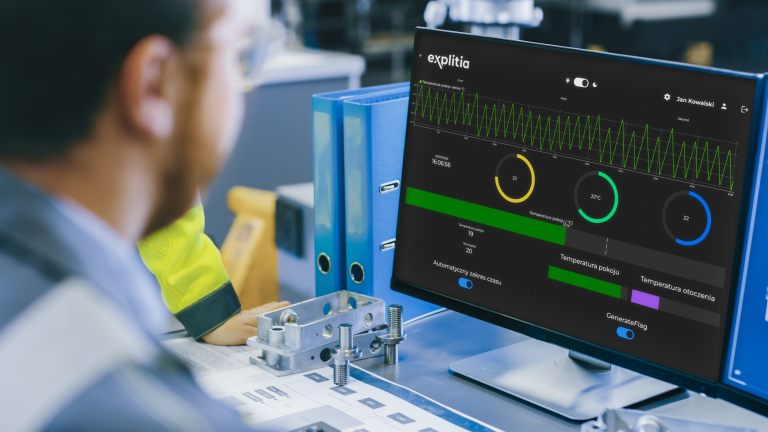In the era of growing ecological awareness and climate change, the carbon footprint has become an immensely significant issue for companies. The key objective is to minimize it and promote the sustainable development of the company. MES (Manufacturing Execution Systems) play a crucial role in optimizing production processes and tracking the environmental life assessment. In this article, we explore the functioning of MES solutions, the benefits of their implementation, and their role in reducing CO2 emissions.
What is the Carbon Footprint?
The carbon footprint, also known as the greenhouse gas emission footprint, measures primarily the amount of carbon dioxide emitted directly or indirectly into the atmosphere. This occurs due to human activities, various processes, or even individual products. These gases have the ability to absorb and emit heat into the atmosphere, creating the so-called greenhouse effect. In this context, the carbon footprint can be seen as a measure of the impact of a particular activity on climate change.
The carbon footprint is often expressed in:
- Kilograms of CO2
- Tons of CO2
- Quantities of other gases (carbon dioxide equivalents) converted to their heat-trapping capacity compared to CO2.
It can be calculated for various fields, such as manufacturing and transportation, as well as energy or specific products.
If you want to explore the topic of the carbon footprint itself, also read Part I and Part II of the series of articles on climate neutrality.
Reducing the Carbon Footprint – MES System
MES is a tool designed to support production realization and management. This advanced IT solution allows for precise control of the entire production process. As a result, it also enables measures to reduce the company’s carbon footprint. Below are several examples of specific benefits resulting from MES implementation:
- Optimization of Production Processes: Efficient production planning, reduced raw material and energy consumption through data collected by the MES system contribute to waste reduction and avoiding resource wastage.
- Monitoring Emissions and Energy Consumption: MES enables continuous monitoring of CO2 emissions and energy consumption during the production process. This helps identify areas where improvements can be made to reduce greenhouse gas emissions.
- Dynamic Production Adjustment: MES adjusts production to current conditions (market demand or availability of renewable energy) in real time. This eliminates overproduction, minimizing the negative impact on the environment.
Parameters collected by MES
- Energy consumption: Systems monitor energy usage at various production stages, identifying areas that can be optimized.
- Raw material consumption: Overuse of resources or waste are problems that MES solves by tracking the amount of raw materials consumed.
- CO2 emissions: Monitoring carbon dioxide emissions related to the production and transportation of raw materials and products helps assess the company’s environmental impact and identify areas for improvement.
- Waste: Effective scrap management can reduce environmental impact by tracking the type and quantity of generated production residues.
- Process efficiency: By monitoring the performance and efficiency of individual production processes, MES systems help avoid wasting time and resources.
- Tracking the carbon footprint: By aggregating data on energy consumption and CO2 emissions, MES solutions assist in calculating the total carbon footprint of production processes and specific products.
- Logistics management: By tracking and improving logistical operations, MES solutions can contribute to reducing CO2 emissions associated with the transportation of raw materials and products.
Unequal Footprint for Identical Products
When mass producing multiple (seemingly identical) products, each may have a different carbon footprint. For example, why is it that when looking at two pens that look the same and perform the same task, each will generate a different carbon footprint? Here are some reasons:
- Material composition: Different materials emit varying amounts of CO2 due to their extraction, production, and transportation. For instance, plastic will have a larger carbon footprint than metal.
- Production process: Various production processes use different technologies, tools, or energy. While a machine may have run completely smoothly during the production of one piece, in moments there may have been downtime and challenges increasing the time and energy required for production. This translates into differences in carbon emissions from the process.
- Energy sources: The energy sources used in manufacturing processes significantly impact CO2 emissions. Products manufactured in regions with a high proportion of renewable energy will have a lower carbon footprint than those produced in regions relying mainly on fossil fuels.
- Suppliers: The carbon footprint of products also includes transportation, not only of the final product but also of the materials needed for production. The practices of supplier companies significantly affect the final CO2 quantity of the product.
Implementation of MES is Not Enough!
Implementing an MES system is certainly one of the most important steps that will bring your company closer to optimizing production processes and potentially reducing the carbon footprint. However, the effectiveness of this system depends not only on technology but also on people and their commitment to analyzing problems and solving them. Why is it so crucial for a company to have a group of experienced specialists?
- One advantage of specialists is their ability to precisely analyze production processes and identify areas for targeted optimization.
- While MES implementation provides data and information, it is the specialists who have the skills to interpret them.
- Customizing the MES system to specific needs and goals, as well as implementing innovative technical or organizational solutions, is crucial for minimizing the negative impact of production on the environment.
- Monitoring progress and results after the MES system is implemented is equally important because specialists can implement any necessary corrections to continually achieve the best results.
MES systems support manufacturing plants in acquiring key data. With reliable and real-time information, it becomes much easier to make business decisions and optimize manufacturing processes, thereby influencing climate neutrality and product quality.
When implementing MES class solutions, it is worth taking advantage of the experience and knowledge of independent technology consultants. If the topic is of interest to you – be sure to write to us.
Contact us
Do you want to move your production plant to level 4.0? Are you interested in modern solutions for industry in the field of automation and digitisation? Be sure to let us know!


